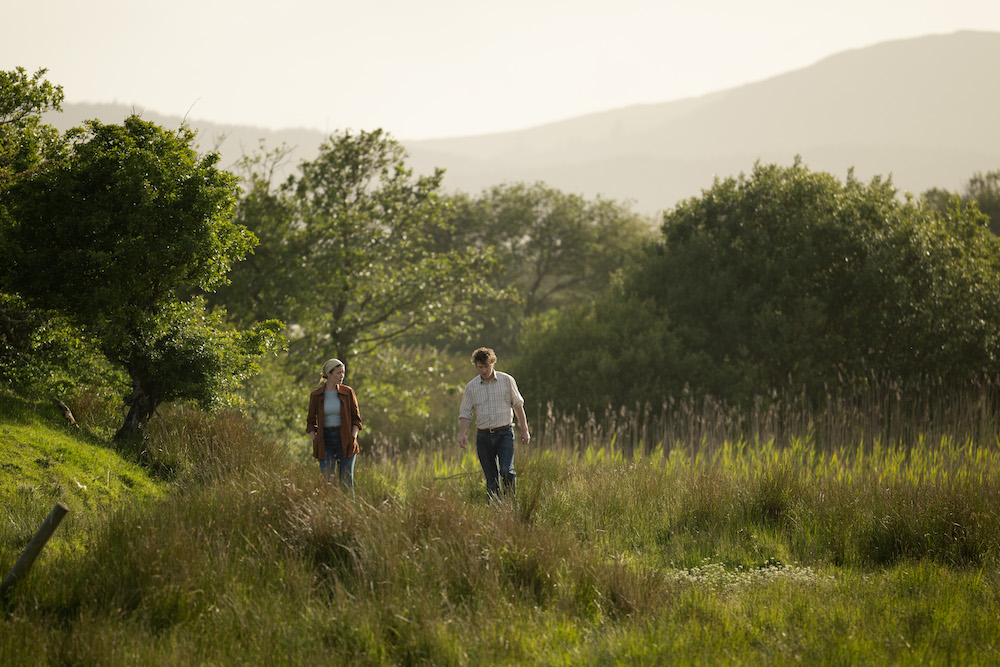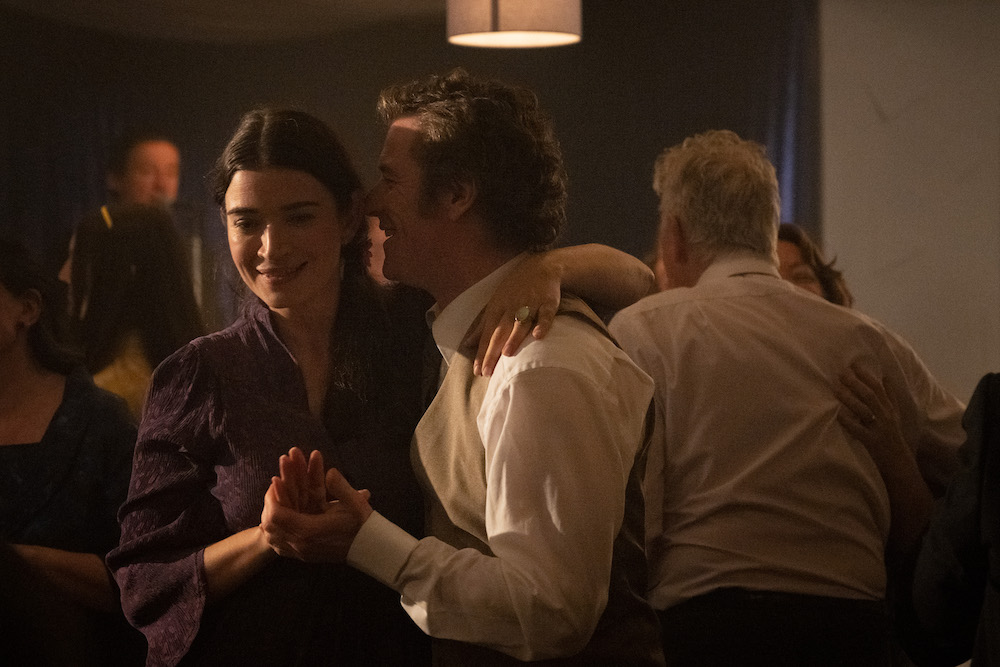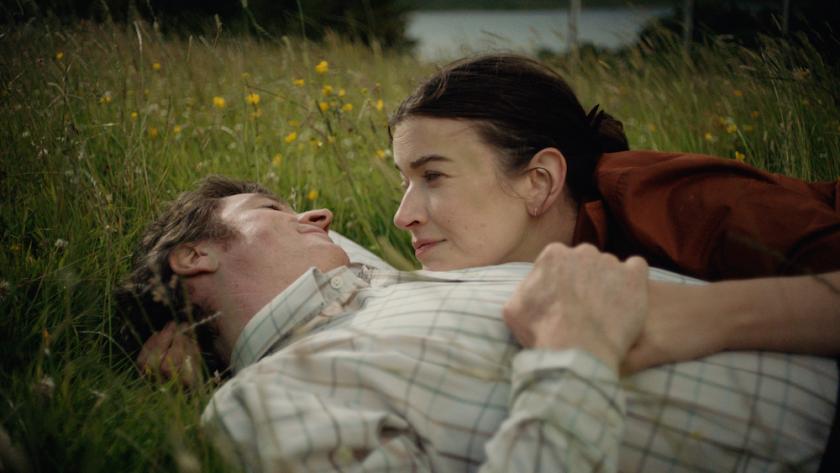In director Pat Collins’s lyrical adaptation of John McGahern’s last novel, with cinematography by Richard Kendrick, the landscape is perhaps the most important character – though there’s a fine cast of well known mainly Irish actors.
If you’re feeling hemmed in by concrete and city life, it’s a balm to take a deep breath and listen to the birdsong while watching the lake, the trees and the hills change colour through the seasons.
Joe and Kate Ruttledge (Barry Ward and Anna Bederke) moved from London two years ago to live in this rural lakeside Irish community (it was filmed in Connemara). It’s the 1970s. He’s a writer who grew up nearby – his rich uncle (John Olohan) still runs the garage - and she’s an artist.
“Do you think you’ll ever make those pictures of yours pay?” asks Patrick (Lalor Roddy), an acerbic neighbour who speaks his mind and thinks most people are eejits. He’s helping Joe build a shed. The work goes very slowly. Never mind, Joe likes looking up at the sky, framed by the rafters. The dialogue and Joe’s ruminations, often straight from McGahern’s novel, are wonderful. The silences are as important. (Collins’s documentary on McGahern came out in 2005.)
Patrick is one of a stream of elderly bachelors who drop in frequently (keeping track of who’s who can be confusing at first) and expect Joe and Kate to provide whiskey and sandwiches. You wonder how they get any work done, but these visits are part of the rhythm of local life. Patrick follows that question with, “Will ye never have children?”
In spite of some neighbours finding it incomprehensible that Joe and Kate should want to go “against the tide” and return to Ireland, they’re content. Though as Joe, a quiet observer, muses, “Happiness could not be sought or worried into being or even fully grasped. It should be allowed its own slow pace so that it passes unnoticed if it ever comes at all.”
 Johnnie (Sean McGinley), another sprightly gent who left years ago to pursue a woman in London and ended up with a miserable job on the Ford assembly line in Dagenham (the worst decision ever made, says Patrick), returns every summer, an event keenly anticipated by his friend. They were both actors at school and like re-enacting their parts in The Playboy of the Western World. They put on a fine show of mocking Kate and Joe behind their backs. “They say what keeps them here is the quiet. Would you listen to the fucking quiet for a moment and see in the name of God if it wouldn’t drive you mad?” says Patrick, and they both cup their ears, frowning, followed by a whoop and a little dance.
Johnnie (Sean McGinley), another sprightly gent who left years ago to pursue a woman in London and ended up with a miserable job on the Ford assembly line in Dagenham (the worst decision ever made, says Patrick), returns every summer, an event keenly anticipated by his friend. They were both actors at school and like re-enacting their parts in The Playboy of the Western World. They put on a fine show of mocking Kate and Joe behind their backs. “They say what keeps them here is the quiet. Would you listen to the fucking quiet for a moment and see in the name of God if it wouldn’t drive you mad?” says Patrick, and they both cup their ears, frowning, followed by a whoop and a little dance.
In England, says Johnnie, they’ve a set way of doing things, “almost alphabetical.” And, according to him, the women in England wear the britches while the men are too washed out to care. But when Johnnie loses his job at Ford, coming back is not so easy.
Johnnie’s brother Jamesie (Phillip Dolan, in his first acting role) and his wife Mary (Ruth McCabe) are comforting presences. “The cuckoo’s back, that’s my news,” says Jamesie, who loves gossip, and can’t understand why Joe, an atheist who was once destined for the priesthood, doesn’t go to Mass “with the other hypocrites” to catch up on events.
 “The rain comes down. The sun shines. Grass grows. Children grow old and die. That’s the holy all of it. We all know it full well but can’t even whisper it,” observes Jamesie. Joe gives him a hand with mowing the meadows and they take the lambs to market together, while Kate learns how to prepare spinning wool from Mary (Kate’s beatific smiles do get a bit trying, it has to be said).
“The rain comes down. The sun shines. Grass grows. Children grow old and die. That’s the holy all of it. We all know it full well but can’t even whisper it,” observes Jamesie. Joe gives him a hand with mowing the meadows and they take the lambs to market together, while Kate learns how to prepare spinning wool from Mary (Kate’s beatific smiles do get a bit trying, it has to be said).
So cynical, seething, contradictory Patrick is a fine counterfoil to this rather impassive couple, as is Bill (Brendan Conroy), a strange, dour figure, damaged by mistreatment at the hands of religious institutions. An orphan, he grabs what he can, including packets of fags from Joe, without thanking. The country, says Joe, is full of battered folk like Bill.
“He’s like a character from a Russian novel,” says a sophisticated man who co-owns a gallery in London with Kate. “He’s not from any novel,” says Joe, bristling. “He’s all ours.” These people are deeply embedded in the place, and by the end, so are Kate and Joe. There’s a wedding, a wake and a burial. “Does anything happen?” Patrick asks Joe about his book. “Or is it the usual heavy-going?” “It’s more of the every day,” says Joe, and so is Collins’s beautiful film.















Add comment